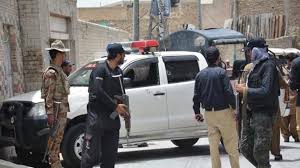Hawzah News Agency (Quetta, Pakistan) - At least one person was killed and more than a dozen injured by a blast at a mosque in south-western Pakistan’s Quetta on Friday, according to police, the latest incident in restive Balochistan province.
The blast took place at the mosque in the city's Pashtoonabad neighborhood during Friday prayers, according to Abdul Razzak Cheema, deputy inspector of police.
The bomb was set off remotely, said Cheema, adding that a bomb squad was dispatched to the site and was investigating. No militant group immediately claimed responsibility for the bombing.
"Three of the injured are in a critical condition including the prayer leader as the blast occurred near him," Cheema said.
Some of the victims were shifted to the government-run Sandeman hospital.
"There were about 100 people there when a bomb exploded very close to the prayer leader," said police officer Abdul Qayum.
Dr Saleem Abro, head of Civil Hospital Quetta, told reporters that two bodies and 15 injured persons –– two of them in a critical state –– were brought to the hospital.
Local media cited an unidentified hospital official as saying that two people were killed and 15 others were wounded.
Residents had flocked to the mosque for Friday prayers during the holy fasting month of Ramadan.
There have been no claims of responsibility for the incident.
The blast comes weeks after a suicide attack claimed by Daesh in the provincial capital Quetta killed at least 20 people.
More than 2,000 people, mostly Shias, have been killed in targeted attacks and suicide bombings in Quetta and other parts of the province in the last 10 years, according to local media reports.
Balochistan, Pakistan's largest and poorest province which borders Afghanistan and Iran, is rife with separatist and sectarian insurgencies, even as incidents of violence have significantly dropped elsewhere in Pakistan.
But militants still retain the ability to carry out attacks, including in major urban centres and tightly-guarded targets, and analysts have long warned that Pakistan is yet to tackle the root causes of extremism.
Balochistan is key to the China-Pakistan Economic Corridor (CPEC), part of Beijing’s Belt and Road initiative.
CPEC seeks to connect China's western province of Xinjiang with Gwadar, giving Beijing access to the Arabian Sea.

